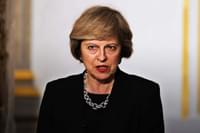
May's letter to Conservative MPs, 16 February 2019
Dear Colleague,
Following last week's vote in the House, I am writing to set out what the Government will be doing this week to take forward our work to secure a withdrawal agreement that can command the support of Parliament.
Whilst the motion was not a binding one, the result on Thursday was nonetheless disappointing and has made our job more difficult. A combination of opposition MPs voting against us and a number of Conservative colleagues abstaining meant that our motion was defeated and Parliament, in effect, agreed to nothing. It is still the case that Parliament's only positive expression of its desired means to achieve our exit from the EU is the motion that was passed on 29 January – that the UK should leave the EU with a deal and that legally-binding changes to the backstop are required in order for it to support a withdrawal agreement. On the basis or that mandate, the Government will continue its work to secure changes to the backstop.
This week I will return to Brussels. Since I met President Juncker on 7 February to begin discussions on how we can address the concerns of Parliament, our respective teams have been holding talks to find a way forward that will work for both sides. I look forward to continuing those talks with him.
I am also continuing my engagement with the leaders of the other EU member states. Over the last few days I have spoken to: Chancellor Angela Merkel; President Emmanuel Macron; the Taoiseach, Leo Varadkar; the Dutch Prime Minister, Mark Rutte; the Prime Minister of Luxembourg, Xavier Bettel; President Klaus Johannis of Romania; the Portuguese Prime Minister, Antonio Costa; Chancellor Sebastian Kurz of Austria; the Swedish Prime Minister, Stefan Löfven; President Dalia Grybauskaite of Lithuania; the Estonian Prime Minister, Jiiri Ratas; the Prime Minister of Malta, Joseph Muscat; the Italian Prime Minister, Giuseppe Conte; the Polish Prime Minister, Mateusz Morawiecki; the Prime Minister of Croatia, Andrej Plenkovic; President Nicos Anastasiades of Cyprus; the Prime Minister of Hungary, Viktor Orban; and the Prime Minister or Finland, Juha Sipila. It is my intention to speak to or meet every other EU27 leader as soon as possible.
My message to each or them, and to the leaders of the EU institutions, is the same: the UK wants to leave the EU as scheduled on 29 March with a guarantee that there will be no hard border in Northern Ireland, there is a majority in Parliament for a revised Withdrawal Agreement, and we need legally-binding changes to the backstop in order to secure that majority.
Ministerial colleagues are also playing a key role in that engagement. On Monday, Steve Barclay will again meet Michel Barnier to talk through the proposals put forward by colleagues in the Alternative Arrangements Working Group. The Government's preference is to avoid the need to use the backstop by agreeing a future relationship with the EU before the end of the implementation period. However, if we have not, the agreement reached in the political declaration means that we can bring an end to the backstop, or avoid using it altogether, by agreeing alternative arrangements to avoid a hard border between Northern Ireland and Ireland. The process of positive engagement that Steve Barclay is leading with colleagues on the Alternative Arrangements Working Group is helping to inform the formulation of our policy in this area. We are working on whether alternative arrangements could replace the current backstop proposals now and, as Steve Barclay told the House on 14 February, we are investing civil service resource in all this work.
Geoffrey Cox will also be in Brussels this week to discuss the backstop with Michel Barnier and officials from the European Commission. Later in the week, he will make a speech setting out in detail his thinking on what can be done to eliminate any legal risk that the backstop nlight be applied indefinitely. As I told the House of Commons last Tuesday, this could take the form of a legally-binding time limit to the existing backstop or a legally-binding unilateral exit clause. Colleagues rightly put a great deal of weight on Geoffrey's legal advice at the time of the last meaningful vote, and we are determined to secure changes to the backstop that will provide colleagues with the legal reassurance they need.
I am very grateful to all colleagues who supported the Government's motion on Thursday. I want to thank in particular those colleagues who did not feel able to support the withdrawal agreement in the meaningful vote last month, but who nevertheless supported the Government in the lobbies on Thursday. They demonstrated a determination to find a way forward for our country. It is also encouraging that our confidence and supply partners the DUP voted with the Government last week.
Delivering Brexit is not an easy process for our party. Proudly, we are a broad church in which a wide range of views co-exist, united behind shared Conservative principles. The UK's membership of the EU has long been a source of disagreement for us – just as it has more widely in the country we serve – and ending that membership after four decades was always going to be a test.
In leading the party over the last two and a half years, I have sought to steer a course that can unite all pragmatic points of view behind a clear and coherent policy: to honour the result of a referendum which we as Conservatives were united in putting to the British people, and to do so by leaving the EU with a negotiated deal that protects our close economic relationship, maintains our security co-operation and meets the needs of all parts of the United Kingdom.
History will judge us all for the parts we have played in this process. I believe that a country with our innate strengths, enviable resources, and enormous talent can face the future with confidence that our best days lie ahead. But we stand now at a crucial moment. I do not underestimate how deeply or how sincerely colleagues hold the views which they do on this important issue – or that we are all motivated by a common desire to do what is best for our country, even if we disagree on the means of doing so. But I believe that a failure to make the compromises necessary to reach and take through Parliament a withdrawal agreement which delivers on the result of the referendum will let down the people who sent us to represent them and risk the bright future that they all deserve.
Without a withdrawal agreement we risk a combination forming in Parliament that will stop Brexit altogether, whatever the long-term consequences for trust in our democracy. Alternatively, the UK might exit the EU without a deal or an implementation period. That would cause disruption to our economy and to people's daily lives, damaging jobs both at home and across the EU.
Instead, our party can do what it has done so often in the past: move beyond what divides us and come together behind what unites us; sacrifice if necessary our own personal preferences in the higher service of the national interest; and rise to the level of events in a way that restores the faith of he British people in our political process.
It would be the action of a Conservative and Unionist Party worthy of that proud name.
With best wishes,
Theresa May











